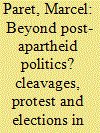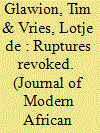|
|
|
Sort Order |
|
|
|
Items / Page
|
|
|
|
|
|
|
| Srl | Item |
| 1 |
ID:
160682


|
|
|
|
|
| Summary/Abstract |
Declining electoral support for South Africa's ruling party, the African National Congress (ANC), suggests a potential weakening of the anti-apartheid nationalism that defined the immediate post-apartheid period. Using two surveys of voters in primarily poor and working-class black areas, conducted during the 2014 (national) and 2016 (local) elections, as well as three case studies of protest by workers, poor communities and students, this article examines the social cleavages and political dynamics that underpinned deepening political competition. Results show that voting decisions varied according to gender, age, ethnicity and receipt of welfare benefits. Different public provisions mattered most during national versus local elections, demonstrating that voters paid close attention to government operations. Underscoring political fluidity, some instances of protest reinforced ANC dominance while others fed into support for the opposition. The findings challenge notions of uncontested one party dominance, revealing instead that some poor black voters are critically evaluating the ANC's performance and developing oppositional political identities.
|
|
|
|
|
|
|
|
|
|
|
|
|
|
|
|
| 2 |
ID:
160678


|
|
|
|
|
| Summary/Abstract |
Focusing on one of the most targeted areas for land investments in Tanzania (Rufiji district), this article compares the involvement of two Tanzanian state agencies in land acquisition, in the context of the central government's new strategy on productive investors. Given the fragmented and contentious authority of many African states, I investigate the impact of state intermediaries on the relationships between investors and local populations and consider bureaucrats as a group of actors to analyse flows of power within the state. I make two main points. First, the central state's weak infrastructural power and resulting lack of local knowledge, and, conversely, local bureaucrats’ possession of these valuable resources, reverses the flow of power from local to central. Second, a central monitoring process might have a negative effect. Instead of protecting vulnerable populations, it fosters institutional innovations that protect local bureaucrats’ opportunities for accumulation with investors, to the detriment of local populations.
|
|
|
|
|
|
|
|
|
|
|
|
|
|
|
|
| 3 |
ID:
160679


|
|
|
|
|
| Summary/Abstract |
Southern Sudan's past crises have mobilised consistent flows of humanitarian assistance. Recalling the humanitarian catastrophes and international interventions of the 1990s–2000s, the war that exploded in South Sudan in 2013 has been no exception. This paper shows that the SPLM/A political elite promptly incorporated these flows of external resources into its extraverted strategies of state-building. Similar to the current situation, it did so by appropriating not only material assets but also discourses, playing the ‘fragile state’ card and raising fears of governance failure and state collapse. This paper analyses two specific aspects of international support to Southern Sudan in the 1990s–2000s: the political legitimisation of the movement through the negotiation of relief delivery, and direct support to rebel local government structures. These two aspects contributed to the creation of a state that substantially overlapped with the SPLM/A structure, thanks to the movement's capacity to capitalise on external resources, a subject worth analysing in future research.
|
|
|
|
|
|
|
|
|
|
|
|
|
|
|
|
| 4 |
ID:
160683


|
|
|
|
|
| Summary/Abstract |
This article examines the smuggling of coltan into and out of artisanal mining areas in northern Katanga where the ITRI Tin Supply Chain Initiative (iTSCi), a policy on conflict minerals, tries to improve transparency in trading tin, tantalum (coltan) and tungsten. The article approaches smuggling from a sociology of economic life perspective, closely examining how and why artisanal miners and mine-based middlemen (négociants) helped smugglers (hiboux) in the trafficking of coltan. The findings indicate that the social networks in which miners and mine-based négociants are embedded allow the miners, négociants and smugglers to maintain close relationships and to breach official regulations, but miners and mine-based négociants also rely on the same networks to cheat in their dealings with the smugglers. This article concludes that, rather than considering coltan mining areas to be ‘enclaves of regulations’, understanding and addressing smuggling at both local and broader contexts call for a comprehensive, more contextualised approach.
|
|
|
|
|
|
|
|
|
|
|
|
|
|
|
|
| 5 |
ID:
160681


|
|
|
|
|
| Summary/Abstract |
Scholars of ethnic riots disagree on which are more susceptible to collective violence between ethnically segregated and diverse socio-spatial settings. Studies of riot-prone cities have produced contradictory conclusions. This article proposes that the ambivalence stems in part from disregarding the mobile nature of armed mobs and conflating their origins with their locations of violence. Drawing upon extensive ethnographic fieldwork involving mobile interviews, in-depth discussions and visual documentation, the article maps the footsteps of armed mobs from their origins to sites of confrontation during the 2008 Christian–Muslim riots in Jos, Nigeria. Findings suggest both segregated and mixed settlements contributed to violence. While armed mobs were likelier to originate from segregated neighbourhoods, mixed settlements, especially those sandwiched between segregated ones, served as frontiers for fighting; armed mobs preferred narrow alleys inaccessible to security forces. These findings' implications can advance the understanding and management of ethnic riots in urban areas.
|
|
|
|
|
|
|
|
|
|
|
|
|
|
|
|
| 6 |
ID:
160680


|
|
|
|
|
| Summary/Abstract |
The Central African Republic experienced unprecedented violence between 2012 and 2014. We analyse three recent ruptures that developed as a result of this crisis, suggesting a break with the country's past. First, the Séléka rebellion that started in 2012; second, the establishment of a robust UN Peacekeeping mission in 2014; and finally, the democratic election of a civilian president in 2016. However, three deep-rooted patterns of governance have in each case transformed these ruptures. A history of outsourced politics, a plurality of violence and peripheral neglect push actors to perpetuate the violent past rather than breaking with it. We conclude that after an initial attempt to break with the CAR's long-term political economic trends, rebel groups, the UN mission and the democratic government have backtracked and now risk reinforcing the violence that mark politics and everyday life in the country.
|
|
|
|
|
|
|
|
|
|
|
|
|
|
|
|
|
|
|
|
|